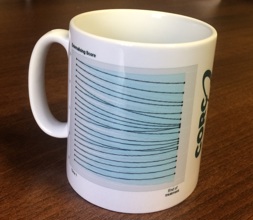Talking outcomes with children and families: Miranda Wolpert reflects on recent seminars and calls for your ideas!
Since the first national CORC report on outcomes for children and young people seen by mental health specialists was published last year I have been taking part in seminars with service users, researchers, practitioners, managers and commissioners across England to discuss the findings.
The report focused on three indicators of outcome based on self-reported questionnaires (NB parent completed questionnaire were also analysed - see full report):
- "Recovery" This referred to children and yougn people who started treatment with self-reported levels of symptoms indicative of significant problems and who ended treatment with no self-reported symptoms indicative of significant problems. 1 in 3 children with relevant information (25% of those seen for treatment) "recovered" using this definition.
- "Reliable improvement" This referred to improvement in scores on at least one questionnaire that was greater than could be likely due to measurement error alone and no deterioration in scores on any measure greater than could be expected from measurement error. 1 in 2 children with relevant information (25% of those seen for treatment) shown reliable improvement and 1 in 10 reliable deterioration.
- "Movement towards goals" This referred to whether children and young people who had indicated they were working towards a goal felt they had moved toward this goal at the end of treatment, even if they had not completely achieved it. 9 in 10 children with relevant information (12% of those seen for treatment) reported moving towards their goal.
Most welcomed the report and said they found it useful, but the fact that we found only 1 in 3 "recovered" and 1 in 2 "reliably improved" are challenging findings and were the focus for much discussion. Below are my reflections based on these rich discussions - with thanks to all involved!
Finding the right words: what can we use instead of "recovery"?
There was much debate around the use of the term 'recovery', particularly for use with children, young people and families. For some, the notion of recovery, and being able to state you have 'recovered' was personally important and potentially empowering. However, many found it too loaded, too high a bar, they were concerned that it diminishes the progress made by those who have made considerable progress despite not crossing that questionnaire defined golden line. They suggest that we need to talk about something else such as 'improvement' or 'development' or 'coping'.
I see these points. Yet I remain of the view that some binary distinction between being broadly OK and being broadly not OK is a vital metric. Such a binary distinction is something that we can all easily understand and discuss. It aids honest conversations between providers and patients/ clients. It helps all parties clarify what is being aimed for. I can see that the term 'recovery' is problematic, especially as what we are talking about in the report is based on thresholds set by questionnaire developers rather than individually determined holistic concepts of recovery. In the light of the conversations I wonder if we might use the term 'symptom free' or the more unwieldy but perhaps more accurate term 'no reported problems indicating ongoing need based on the questionnaire thresholds'.
I would be very interested to hear from members their suggestions for language around a binary description of better/ not better, recovered/ not recovered - open to good ideas on this!
Being outcome focused from the outset: considering outcomes with children and families
In the seminars we started to explore how these findings might be used in front line practice. Again there was much debate on this issue.
We explored how to include a consideration of outcomes and realistic expectations of treatment impact from the start. Some ideas we have discussed include:
- Being ending focused from the outset e.g. "after the agreed number meetings we will review how things are going. We can then decide it if makes sense to change tack or to end treatment"
- Monitor only what is important to the client e.g. "We will focus on what is important to you - based on what you have told me - and review your progress every time we meet on the scales we have agree to use to monitor this"
- Consider likely end point - use of trajectories? e.g. "The self-report measures we are using will show us how things are progressing. We can use these predictive charts to consider what is realistic to expect in terms of these indicators"

We could use different imagery to consider likely trajectories of change. At the seminars we introduced mugs showing trajectories over time and have also been working on interactive trajectories 'torches' to give indications for outcome measure scores at end of treatment. - Focus on self-management and empowerment e.g. "We will focus on ways you can manage your difficulties yourself so that you are in control rather than your problems"
Some of those at the seminars thought these ideas were interesting others were not so sure. Many felt this approach was least suitable to children who may need a long time to establish trust and be hopeful about change.
I would be very interested to hear how members talk to children and families they work with about what to expect in terms of outcomes - we are keen to collate and share emerging practice on this and how it might be different for different groups.